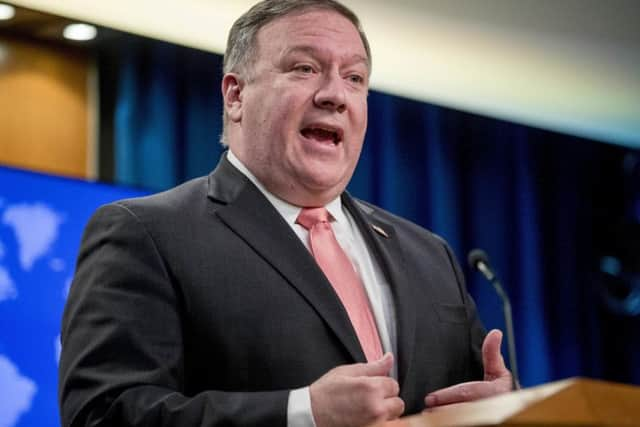Iran: Donald Trump's foreign affairs advisor dismisses Iraqi calls for America to withdraw troops
The US Secretary of State said that despite a non-binding resolution passed by the Baghdad Parliament to have all foreign military withdraw - and ban them from using Iraqi land, airspace or water for any reason - the people of Iraq still supported US troops in their country.
Iraqi MPs called for foreign troops to leave after the US killed top Iranian general Qasem Soleimani in a drone strike at Baghdad airport last week. The strike also killed eight others, including Abu Mahdi al-Muhandis, an Iraqi militia leader.


Advertisement
Hide AdAdvertisement
Hide AdIraqi Prime Minister Adel Abdul Mahdi said the US strike was “a political assassination” and told parliament that the government must establish a timetable for the withdrawal of all foreign troops “for the sake of our national sovereignty.”
The US has some 5,000 military personnel in Iraq, mainly as advisers, while the UK has at least 1,400 military and UK government civilian personnel in Iraq as part of Operation Shader, the ongoing military intervention against the Islamic State of Iraq and the Levant.
However Mr Pompeo, on today's US TV news shows, brushed aside the remarks, calling Mahdi “the resigned prime minister” and “the acting prime minister.”
“He’s under enormous threats from the very Iranian leadership that it is that we are pushing back against,” Mr Pompeo said. “We are confident that the Iraqi people want the United States to continue to be there to fight the counter-terror campaign. And we’ll continue to do all the things we need to do to keep America safe.”
Pressed on what America would do if the Iraqi parliament demands that American troops leave the country, Pompeo declined to say.
“We’ll have to take a look at what we do when the Iraqi leadership and government makes a decision,” he said.
“But the American people should know we’ll make the right decision. We will take actions that, frankly, the previously administration refused to take to do just that.”
Asked asked about Donald Trump’s tweet in which he pledged to target 52 unspecified Iranian sites if there was any retaliation, Mr Pompeo insisted that the United States will “behave lawfully” and “inside the system.”
Advertisement
Hide AdAdvertisement
Hide Ad“Previous administrations let militias take shots at us and we responded in theater,” he said. “We have told the Iranian regime, ‘Enough.’ We’re going to respond against the actual decision-makers, the people who are causing the threat."
The Scotsman understands the Foreign Office will respond to the vote of Iraqi MPs later today, as Boris Johnson is expected to be back in Downing Street after his New Year holiday in Mustique.
Foreign Secretary Dominic Raab earlier refused to back the US decision to kill General Soleimani, but said he was a "regional menace" and America had a "right of self-defence".
Mr Johnson is under mounting pressure from opposition leaders to make a statement on the killing of General Qassem Soleimani and rising fears of all-out war after Iran threatened revenge over the attack.
Britain has already sent two warships to the Persian Gulf in a bid to protect citizens. Defence Secretary Ben Wallace has confirmed the HMS Montrose and HMS Defender have been sent back to resume maritime patrols in the Strait of Hormuz, between the Persian Gulf and the Gulf of Oman, claiming the government had ordered the vessels "to take all necessary steps to protect our ships and citizens at this time".
They will accompany British-flagged ships to ensure they make it safely through the Strait, a particularly vulnerable area as 30 per cent of the world’s oil passes through it from the Gulf to the oceans.
Iraq finds itself in a difficult position as an ally both of neighbouring Iran and of the US. Thousands of US troops remain in the country to assist in the broader struggle against the Sunni Muslim Islamic State. But the government sees the killing as a violation of its sovereignty, and of the terms of the coalition presence in Iraq.
Meanwhile, a variety of Shia Muslim militia groups in Iraq are supported by Iran, and there are concerns that parts of Iraq's population sympathetic to Iran have been alienated by the killing, and that militant groups may seek revenge.
Advertisement
Hide AdAdvertisement
Hide AdCalls for revenge have multiplied in Iran since Soleimani's assassination, which has thrown US foreign policy in the Middle East into question, and Iraq's parliament met as hundreds of thousands of people turned out in Iran to mourn the dead general.
